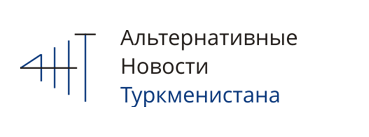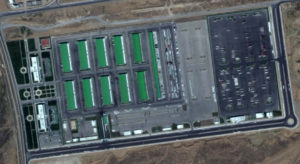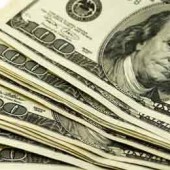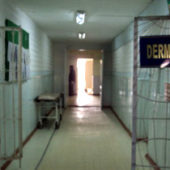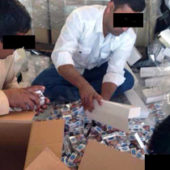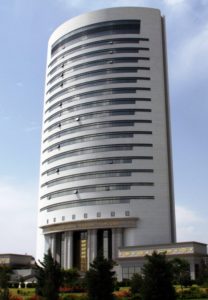 From June 1st, entrepreneurs and companies importing from abroad to Turkmenistan will not be able to clear their goods at customs without a stamp from the State Commodity and Raw Materials Exchange. While the new provision entered into force on June 1st, yet customs officers started to request the official stamp a week in advance. Sources said it is not easy to obtain the stamp.
From June 1st, entrepreneurs and companies importing from abroad to Turkmenistan will not be able to clear their goods at customs without a stamp from the State Commodity and Raw Materials Exchange. While the new provision entered into force on June 1st, yet customs officers started to request the official stamp a week in advance. Sources said it is not easy to obtain the stamp.
The requirement of a clearance from the commodities exchange had been in place earlier under Saparmurat Niyazov, until 2008. The government suspended the requirement after the equalization of the market and the official exchange rate and the growing income from the export of natural resources. Since 2008, entrepreneurs and companies trading under contracts below $1 million, could avoid requesting the official stamp.
However, as the country’s economic situation has worsened since 2014, the currency “black market” has re-emerged together with stringent restrictions on access to foreign currency for entrepreneurs, such as the conversion of manats into dollars. The decision to interpose the commodities exchange as a filter between suppliers and customers came after the president strongly criticized the Minister of Finance and the chairman of the Central Bank, sources close to the economic branches of the government said.
“Reintroducing the official commodities exchange stamp is telling of the fact that in the fight against the financial crisis the government could do nothing but return to the same draconian regulations and rules that had strangled Turkmen business for years after independence,” an economist in Ashgabat said.
The purpose of this decision is to reduce trade in foreign currency by controlling the purchase prices for imported goods. However, entrepreneurs said that they are skeptical of the commodities exchange’s ability to fairly regulate the process because of rampant corruption among its ranks. An entrepreneur from Mary explained the inner workings of the new rule.
— Let’s say, you hold a contract for importing vegetable oil from Russia at $1 per bottle. You have to bring four copies of your contract to the commodities exchange. They give you a number and tell you to come in 2 or 3 days. The nagging will start here. They will go through the whole contract with a pencil and annotate their complaints: “Why did you pick 60-day payments instead of 30-day payments?”, “why did you write this and not that?”. The most important issue, however, is the cost of the imported goods. They will say that, according to their data, the oil you are importing costs 50 cents, not $1, and they will give you back the contract, unstamped. They won’t explain where “their data” comes from. Information on international prices can often be quickly looked up on the internet. Arguing or showing official price lists and vendor invoices will not help. “We know nothing about what you are telling us, just write 50 cents, otherwise the contract will not pass the commodities exchange rule and will not be registered…”
In order to get a seal and keep the original price entrepreneurs will have to pay bribes, upwards of $300, depending on the total amount of the contract. This in addition to the commodities exchange’s official registration fees. Only after all these obstacles are cleared, the officials will place the sought-after stamp on your copies of the contract. The commodities exchange will keep one copy, the customs office will need the second copy to clear the goods and allow shipments within the country, the bank will need to see the third copy before allowing the conversion of up to 3% of the value of the contract into foreign currency, while you keep the last copy.
Every entrepreneur has his own contact at the commodities exchange, he will be in charge of unlocking the stalemate on a contract for $300 or $400. This the only way you can get your document stamped within two days. This scheme makes it harder for emerging entrepreneurs, who do not have a trusted contact and in turn are looked upon with suspicion by the bribe-takers…
Undoubtedly, some entrepreneurs deliberately ask suppliers to inflate prices for goods. For example, customers ask suppliers to write $3 for a jar of coffee purchased for $1. This is a common way of increasing the amount that they can then convert into foreign currency. While not every entrepreneur implements this scam, everyone will suffer its consequences.
According to some, the law enforcement bodies know about corruption at the Commodity Exchange. Employee turnover rate at the Commodity Exchange is high; some even end up in prison, but bribery cases have not decreased. Those convicted get out of prison after only two or three years, and the money they accumulated through such schemes will last them for decades.
The new rules will only complicate the whole bureaucratic process and increase costs for importers, entrepreneurs noted. They will have to hire a dedicated worker to deal with the Commodity Exchange, to file the correct requests, to get a “business passport” for the bank, to physically visit the Commodity Exchange and the Customs office, and to get quality certificates for foodstuff. Since the new provision has been effectively applied on May 24, local ATN observers have already registered delays at customs for the clearance of goods, which in turn has caused a shortage at the bazaars. All this has affected retail prices.
This situation begs a question: where is the Union of Industrialists and Entrepreneurs, which, in theory, should stand for the protection of the interests of its members? Why is the role of this business association limited only to cash in the membership fees? The Union should be to lobby for reasonable and profitable business conditions. Instead, membership has become a necessary, but not sufficient, condition to gain access to government tenders or supply-chain contracts. In these conditions, entrepreneurs are left on their own to defend their rights and opportunities to trade.
